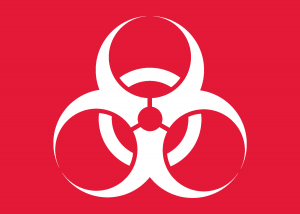 All laboratory personnel and others whose work requires them to enter the laboratory must understand the chemical and biological hazards and be trained in appropriate safety precautions and procedures. Personnel are required to know, understand, and follow standard practices and procedures. In addition to EHS-mandated safety training, additional laboratory safety training shall be provided by the Principal Investigator or their designate and competence in safe techniques must be demonstrated and documented before the personnel is allowed to work with hazardous agents or toxic materials. Please see the EHS Training Matrix to know which training is required in addition to the specific biosafety training below.
All laboratory personnel and others whose work requires them to enter the laboratory must understand the chemical and biological hazards and be trained in appropriate safety precautions and procedures. Personnel are required to know, understand, and follow standard practices and procedures. In addition to EHS-mandated safety training, additional laboratory safety training shall be provided by the Principal Investigator or their designate and competence in safe techniques must be demonstrated and documented before the personnel is allowed to work with hazardous agents or toxic materials. Please see the EHS Training Matrix to know which training is required in addition to the specific biosafety training below.
Training Matrix for Lab Personnel
Training Matrix for Administrative and Facilities Staff
Registering for Training
EHS courses are restricted to University of Toronto employees, students and externals conducting authorized activities at the university requiring specific EHS training as deemed necessary by management. Please refer to the EHS Training Matrices to learn which courses are required for your work at the university:
Training Matrix for Lab Personnel
Training Matrix for Administrative and Facilities Staff
Access to My EHS training requires you to log in with a UTORid and create a profile. If you do not have a UTORid, please refer to our guide: Completing EHS training for Externals for instructions on obtaining a Long-Term Guest UTORid and registering for training.
ehs.utoronto.ca/training/my-ehs-training
Other EHS services

 Chemical and Lab Safety
Chemical and Lab Safety Environment Protection Services
Environment Protection Services